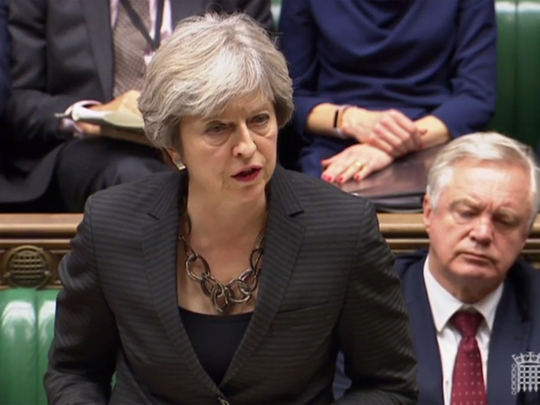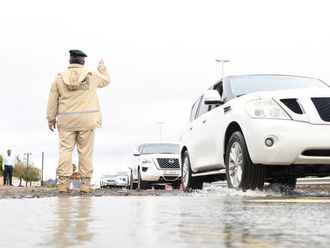
The Scottish referendum was held only a little more than three years ago, but it belongs to a different political age — the all-male era of David Cameron, Nick Clegg, Ed Miliband, George Osborne and Alex Salmond — and in my case, a different emotional one. In the run-up to the yes/no vote on Scottish independence, I wrote a long piece on what Britain meant to me as a place and Britishness as an identity, ending with the thought that if the ‘yes’ side succeeded, then the United Kingdom that had shaped so many of us would no longer exist. “If it happens, I shall grieve” was my closing sentence.
Journalism, like writing of all kinds, is filled with the rhetorical flourish: Things overstated, half-meant, or sometimes not meant at all. But whatever the faults of the piece as a whole, I would take an oath to say its final sentiment was completely sincere.
I had no vote in the referendum, but as usual I’d spent the summer in Scotland and, as August turned into September and the opinion polls narrowed, I began to fret obsessively that where I stood, “the ground beneath my feet”, might soon belong to a different nation-state; and that I’d soon be hankering after a country that no longer existed, like some white-moustached old soldier remembering the complicated virtues of the Austro-Hungarian empire. Even now I associate certain places — an empty tearoom, a hollow in the grass above the beach — with that feeling of anxiety that grew three years ago under a glorious, uncaring September sun.
An old fire-engine workshop in Vauxhall, south London, is an odd venue to be reconnected to those memories, but it was there last week, in the temporary home of the Migration Museum, that a thinktank called These Islands was launched which, to quote its statement of values, “stands unabashedly for the view that more unites the three nations of Great Britain than divides them, and that good relations between the various communities of Northern Ireland, the United Kingdom and the Republic of Ireland are all the more important to work for in the wake of Brexit”.
In other words, and not forgetting that “these islands” allows the inclusion of the Isle of Man and the Channel Islands as well as the Irish Republic in any discussion, this is a broadly pro-unionist body that believes that the UK has more to offer its constituent parts than the comfort of subsidies distributed by the Barnett formula, afforded from taxes raised largely in the City of London.
The official unionist case in the Scottish referendum famously depended on the financial argument that independence would make Scotland poorer — hence Project Fear — and other than in a late intervention from Gordon Brown, it tended to avoid appeals to historic achievement or the culture and ways of living that we hold in common. The consequences of leaving the union were measured in pounds, quite literally; and as the Westminster government won in 2014, it rolled out a similar negative strategy in the European Union (EU) referendum two years later, in which the positives of EU membership were never stressed.
In 2014, nonetheless, a few individuals did try to draw attention to the less hardheaded case for unionism, sometimes in a less than hardheaded way. The Tory member of parliament Rory Stewart devised what he called a cairn of friendship or “auld acquaintance” at Gretna Green, where people from both sides of the border were invited to lay a stone. The popular historians Tom Holland and Dan Snow organised an open letter signed by 200 non-Scottish celebrities, including Mick Jagger, David Attenborough and Stephen Hawking, saying how much they valued the shared bonds of UK citizenship. David Bowie pleaded for Scotland to stay .
The new thinktank was founded by three people who met at that time: Tom Holland; another historian, professor Ali Ansari; and the businessman and blogger Kevin Hague. They have assembled a 40-member advisory council rich in good names, including Lady O’Neill, professor Margaret MacMillan and Lord Hennessy of Nympsfield.
The aim is to inform and develop the unionist case — in the words of Nigel Biggar, Oxford University’s regius professor of moral and pastoral theology —to remedy “the faltering inarticulacy of unionists in explaining what the United Kingdom is good for” during the 2014 referendum; an inarticulacy that came about, so Biggar writes in the thinktank’s first published paper, from “the natural difficulty of describing the very ground upon which we have long been standing”.
So what is the UK good for? According to Biggar, three things: As a bulwark against Russia’s threat to liberal democracy; as an example of multinational solidarity (the depth of which “the European Union can still only dream”); and as a prominent upholder of a humane international order — “a post-imperial habit” that for the world’s sake the UK needed to keep. All of these things will remain true “whether or not Brexit comes to pass”, but all will be diminished if the UK breaks apart.
As befits his job, he has a moral view. A nation that wants to leave the UK needs to have motivating grievances that are serious and not trivial, chronic and not temporary, and current rather than historic. Otherwise, the risks “that almost invariably attend political divorce” can’t be justified: They would be recklessand imprudent “and therefore morally wrong”.
This is confidently written, but where does the European referendum fit in? If the people of England want out, and the people of Scotland and Northern Ireland prefer to stay, where does that leave Biggar’s multinational solidarity? Would a second Scottish referendum be morally wrong? Would it be morally wrong of Northern Ireland to choose reunification with the Republic ?
Perhaps the answers hardly matter, because in the end the questions will be settled by economics: On Dublin’s readiness to take on the expense of Northern Ireland, and on a Scotland that would find it hard to push for independence when it exports four times more to the rest of the UK than it does to the rest of the EU. Listening to the participants at the launch of These Islands, I was struck, like others there, by how little of this kind of conversation had gone on before the European referendum, and by how unprepared we had been for the bitter social division left in its wake.
Salmond used to talk confidently of how the social union between England and Scotland would survive undamaged by Scottish independence, but post-Brexit England suggests an angrier and more contested outcome, with (to quote Biggar) tough and fraught negotiations awakening old resentments on both sides. England and Scotland, after all, have been far more deeply integrated than the UK and the EU, and for seven times as long.
Three years on, I would find it much harder to grieve for the end of Britain. Brexit and a strident English nationalism have changed everything. On the other hand, an independent Scotland seems economically impossible at its present standard of living, and we have a sense now (soon to be enlarged) of how painful a process the cutting of political and commercial entanglements can be. In these circumstances, the thinktank These Islands may find its true purpose in encouraging us to make the best of things: Apep talk to a weary couple holding on to the wreckage.
— Guardian News & Media Ltd
Ian Jack is a Guardian columnist. He edited the Independent on Sunday from 1991 to 1995 and Granta magazine between 1995 and 2007.










